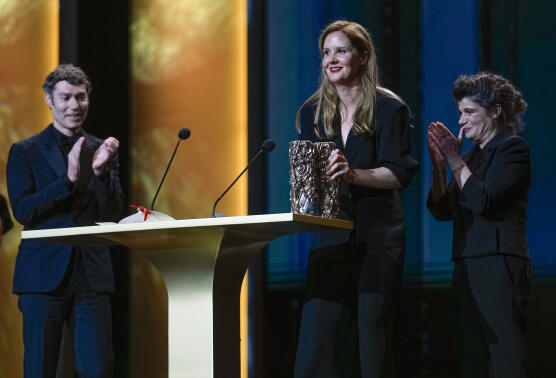In a resounding moment of defiance against the pervasive culture of sexual violence in the French film industry, actress Judith Godrèche delivered a stirring speech at the Césars Awards on Friday, February 23.
As the spotlight shone upon her, Godrèche seized the opportunity to denounce the “level of impunity, denial, and privilege” that has long haunted the industry.
Her words reverberated through the auditorium, igniting a fervent discussion that overshadowed even the evening’s most celebrated victories.
Godrèche, a prominent figure in France’s #MeToo movement, courageously revealed her own traumatic experiences, accusing directors Benoît Jacquot and Jacques Doillon of sexually assaulting her during her teenage years.
Both directors vehemently deny these allegations, yet Godrèche’s unwavering resolve lent a powerful voice to the countless survivors who have been silenced by fear and intimidation.
“Why accept that this art that we love so much, this art that binds us together, is used as a cover for illicit trafficking of young girls?” she questioned, challenging the audience to confront the uncomfortable truths lurking beneath the glamour of the silver screen.
Her impassioned plea underscored the urgent need for accountability and systemic change within the industry.
The evening’s triumphs and accolades paled in comparison to the seismic impact of Godrèche’s speech.
Despite the accolades bestowed upon “Anatomy of a Fall,” which clinched six trophies, including Best Film, it was Godrèche’s unwavering bravery that left an indelible mark on the collective consciousness.
Director Justine Triet, only the second woman to ever win the Best Director César, dedicated her award to the countless women who have endured suffering and abuse.
Her poignant gesture served as a poignant reminder of the resilience and strength displayed by survivors in the face of adversity.
Triet’s acclaimed thriller, “Anatomy of a Fall,” resonated deeply with audiences, offering a poignant exploration of the complexities of female agency and empowerment.
The ceremony, however, served as a stark contrast to the 2020 edition, marred by controversy following Roman Polanski’s controversial win for Best Director.
Actress Adèle Haenel’s impassioned protest highlighted the industry’s complicity in perpetuating a culture of impunity, particularly concerning figures like Polanski, who remains a fugitive from US justice over a child sex conviction from the 1970s.
From the outset, the question of sexual violence loomed large over the proceedings, as actress and director Valerie Lemercier delivered a powerful opening address, condemning the entrenched patriarchal norms that have enabled exploitation to flourish unchecked.
The recognition bestowed upon Adèle Exarchopoulos for her role in “All Your Faces,” which tackles the harrowing subject of incest, further underscored the industry’s growing willingness to confront taboo subjects head-on.
Prior to the ceremony, French Culture Minister Rachida Dati decried the pervasive “collective blindness” that has shielded perpetrators from accountability for far too long.
Dati’s remarks underscored the urgent need for systemic reform and a renewed commitment to fostering a safe and inclusive environment for all industry professionals.
The allegations leveled against screen legend Gérard Depardieu, coupled with President Emmanuel Macron’s controversial defense of the actor, have ignited a national reckoning with the prevalence of sexual misconduct within the highest echelons of French cinema.
Depardieu, charged with rape and facing numerous accusations of harassment and assault, stands as a stark reminder of the entrenched power dynamics that have enabled abuse to flourish with impunity.
As the dust settles on the Césars Awards, one thing remains abundantly clear: the time for silence and complacency has long since passed.
Through the courage and resilience of voices like Judith Godrèche and Justine Triet, a new chapter is being written—one marked by accountability, solidarity, and a steadfast commitment to upholding the dignity and rights of all individuals, regardless of gender or status.
Only by confronting the uncomfortable truths of our past can we hope to build a future free from the shadows of exploitation and abuse.
This article was created using automation technology and was thoroughly edited and fact-checked by one of our editorial staff members



